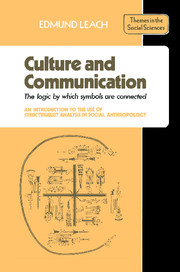 Culture and Communication
Culture and Communication Book contents
- Frontmatter
- Contents
- Culture and communication: the logic by which symbols are connected
- Introduction
- 1 Empiricists and rationalists: economic transactions and acts of communication
- 2 Problems of terminology
- 3 Objects, sense-images, concepts
- 4 Signals and indices
- 5 Transformations
- 6 Theories of magic and sorcery
- 7 The symbolic ordering of a man-made world: boundaries of social space and time
- 8 The material representation of abstract ideas: ritual condensation
- 9 Orchestral performance as a metaphor for ritual sequence
- 10 The physiological basis of sign/symbol sets
- 11 Mapping: time and space as reciprocal representations
- 12 Rank order and orientation
- 13 Examples of binary coding
- 14 Mating prescriptions and proscriptions
- 15 Logic and mytho-logic
- 16 Basic cosmology
- 17 Rites of transition (rites de passage)
- 18 The logic of sacrifice
- 19 Conclusion
- Bibliography
- Index
6 - Theories of magic and sorcery
Published online by Cambridge University Press: 05 June 2012
- Frontmatter
- Contents
- Culture and communication: the logic by which symbols are connected
- Introduction
- 1 Empiricists and rationalists: economic transactions and acts of communication
- 2 Problems of terminology
- 3 Objects, sense-images, concepts
- 4 Signals and indices
- 5 Transformations
- 6 Theories of magic and sorcery
- 7 The symbolic ordering of a man-made world: boundaries of social space and time
- 8 The material representation of abstract ideas: ritual condensation
- 9 Orchestral performance as a metaphor for ritual sequence
- 10 The physiological basis of sign/symbol sets
- 11 Mapping: time and space as reciprocal representations
- 12 Rank order and orientation
- 13 Examples of binary coding
- 14 Mating prescriptions and proscriptions
- 15 Logic and mytho-logic
- 16 Basic cosmology
- 17 Rites of transition (rites de passage)
- 18 The logic of sacrifice
- 19 Conclusion
- Bibliography
- Index
Summary
The performances which anthropologists classify as magic and sorcery provide excellent examples of the ambiguities I have been discussing and of the mixture of metonymic and metaphoric association which is characteristic of all modes of human communication.
The point that I want to get across to you in this section is that, with slight modification, the technique of analysis which Lévi-Strauss has applied so successfully to the interpretation of myth can be made to throw light on the logical mystifications of ‘magic’.
Perhaps the first point to emphasise here is that ambiguity needs to be distinguished from error.
Earlier in this century anthropologists took it for granted that the manifest technological inferiority of primitive societies was the consequence of a general mental incapacity. Belief in magic was a symptom of this inferiority; it provided evidence that all primitive peoples are essentially childish and mentally confused.
The most generally accepted version of this theory was that of Sir James Frazer. In effect, Frazer held that ‘expressive acts which purport to alter the state of the world by metaphysical means’ are mistaken attempts at ‘technical acts which alter the state of the world by physical means’ (see above, p. 9). He declared that magic is ‘bastard science’; its fundamental quality is erroneous belief about cause and effect. He then went on to distinguish two major types of the erroneous cause/effect nexus: (1) homoeopathic magic depending upon ‘the law of similarity’; (2) contagious magic depending upon ‘the law of contact’.
In so far as Frazer was wrong he was wrong in an interesting way.
- Type
- Chapter
- Information
- Culture and CommunicationThe Logic by which Symbols Are Connected. An Introduction to the Use of Structuralist Analysis in Social Anthropology, pp. 29 - 32Publisher: Cambridge University PressPrint publication year: 1976
